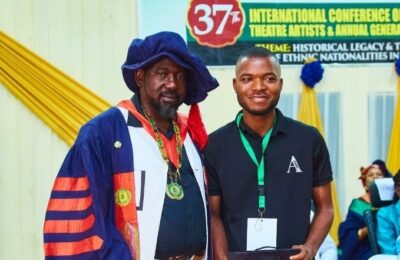Human trafficking is the illegal trade of human beings, primarily for forced labor or sexual exploitation. It involves the recruitment, transportation, harboring, or receipt of people through the use of force, fraud, or coercion. It’s essential to recognize that it affects men, women, and children, and no country is immune to this crime.
Human trafficking is a source, transit, and destination country for women and children who are subjected to forced labour and prostitution. The U.S. State Department’s Office to Monitor and Combat Trafficking in Persons placed the country in “Tier 2 Watchlist” in 2017. Trafficked people, particularly women and children, are recruited from within and outside the country’s borders for involuntary domestic servitude, sexual exploitation, street hawking, domestic servitude, mining, begging. Some are taken from Nigeria to other West and Central African countries, primarily Gabon, Cameroon, Ghana, Chad, Benin, Togo, Niger, Burkina Faso, and the Gambia, for the same purposes. Children from other West African states like Benin, Togo, and Ghana, where Economic Community of West African States (ECOWAS) rules allow for easy entry are also forced to work in Nigeria, and some are subjected to hazardous jobs in Nigeria’s granite mines.
Europe, especially Italy and Russia, the Middle East and North Africa, are prime destinations for forced prostitution. Nigerians accounted for 21% of the 181,000 migrants that arrived in Italy through the Mediterranean in 2016 and about 21,000 Nigerian women and girls have been trafficked to Italy since 2015.
Human trafficking in Nigeria is due to population boom and unfavourable economic conditions that aggravate unemployment, underemployment and insecurity which prompt citizens to seek for better opportunities in other countries. These opportunities include education, decent jobs and higher income. About 15 million Nigerians reside outside Nigeria as a result of demand for access to quality life. Trafficking remains a major challenge to the global community, because it is a threat to human and the causes of crimes in the world at large.
Since 2009, Nigeria has made efforts to tackle human trafficking through collaboration with the Police, customs, immigration, Network Against Child Trafficking, Abuse and Labour (NACTAL) and National Agency for the Prohibition of Trafficking in Persons (NAPTIP). Specifically, the Public Enlightenment Unit of NAPTIP, with focus in remote areas of Benue, Kogi, and Edo states, partners with Devatop Centre for Africa Development to create awareness and had educated over 5000 women, teenagers, educators and youth on human trafficking prevention. In 2015, they initiated “The Academy for Prevention of Human Trafficking and Other Related Matters (TAPHOM),” a pilot project to train anti-human trafficking advocates to combat human trafficking in their communities. Between 2015 and 2016, the project have trained 120 people from 6 states.
Through these programs, two brothels in Lagos were closed, with 12 females and 6 underaged rescued in the first quarter of 2010. In February 2020, the police also recovered 232 sex trafficking victims and forced labour in the capital city of Niamey. These recovered victims and the likes are usually provided shelter at any of the NAPTIP’s eight designated shelters, alongside food, clothing, recreational activities, psychological counselling and vocational training depending on the needs of the victims at any point in time. In such cases, victims stay in the provided shelters for six weeks and are moved to civil society agencies for longer duration. In 2009, Government’s expenditure on NAPTIP’s shelter facilities was estimated to be 666,000 and vocational training support had been provided for 70 victims as well.
Poverty, lack of education, demand for cheap labor/sex, lack of human rights protections, lack of legitimate economic opportunities, lack of safe migration options etc are some of the major causes of human trafficking. Poverty, especially extreme poverty, is one of the most significant drivers of human trafficking. Extreme poverty is defined as living with less than $1.90 a day.
While efforts to end extreme poverty were on the right track, the COVID-19 pandemic reversed progress. In 2020, for the first time in twenty years, the number of workers living in extreme poverty rose from 6.7% in 2019 to 7.2%. That increase represented 8 million people. To find better work, many people migrate, which makes them more vulnerable to traffickers. People also sell their own family members, including their children to survive or in the hopes their loved ones might get a chance at a better life. Other causes of human trafficking, like a lack of education and legitimate work, are closely tied to poverty.
The Universal Declaration of Human Rights lists education as a human right in article 26. “Everyone has a right to education,” the text reads. It goes on to stipulate that education should be free (at least in the elementary and fundamental stages) and compulsory, while technical and professional education should be made “generally available.” Higher education should be “equally accessible to all on the basis of merit.” When people don’t get a good education, it negatively impacts their lives and the lives of their families, including their children. Income potential is a big reason why. It is much harder to escape poverty without education.
Additionally, the types of jobs that tend to not require academic education, like agricultural work, mining, fisheries, construction work, and domestic service, have higher rates of trafficking. Good education helps people get better work and avoid the conditions that lead to exploitation.
The demand for cheap labor or sex is another major cause of human trafficking. Consumers are always looking for cheaper products and services. Unfortunately, this drives corporations to look for cheaper labor, which incentivizes exploitation and trafficking. Industries like agriculture, fishing, mining, and domestic work are especially ripe for exploitation. Commercial sex is also very in demand, which encourages traffickers to supply more people, especially women and girls.
According to 2020 UNODC data, women and girls make up 65% of trafficking victims. 90% of them are trafficked for commercial sex. Children are also especially vulnerable to exploitation like forced labor, forced marriage, armed conflict, and commercial sex as they’re easier to manipulate and abuse. Globally, 1 out of every 3 victims are children. As long as there’s demand, vulnerable groups like children are in danger.
Also, lack of human rights protections aid trafficking. Many legal frameworks forbid human trafficking like debt bondage, child sexual exploitation, forced marriage, and forced prostitution. However, as the UN’s Office of the High Commissioner Fact Sheet 36 on Human Rights and Human Trafficking reads, not all legal frameworks center on human rights. Certain aspects of trafficking may be addressed as immigration, crime, or public order issues as opposed to human rights issues. When human rights aren’t centered, it can be trickier to determine who is responsible for responding to and preventing human trafficking.
Anti-trafficking efforts can be scattershot and ineffective. Even when they do identify victims, victims can be retraumatized when their rights are not protected. Trafficking is a clear violation of human rights, but if anti-trafficking activities don’t use a rights approach, attempts to end trafficking can cause more harm.
Another determinant of human trafficking is, lack of legitimate economic opportunities. No one wants to be trafficked and exploited, but a lack of legitimate economic opportunities can drive people into dangerous situations. They’re more likely to take risks if they have no better options. COVID-19 caused an increase in unemployment, especially among women and youth workers, who are already at a higher risk for trafficking. People from low-income countries with high unemployment and the most vulnerable groups in wealthy nations are the most vulnerable. Stabilizing economies and improving economic development give people more legitimate economic opportunities, so they aren’t driven into risky situations by desperation.
Moreso, a lack of safe migration options can also contribute to humab trafficking. Refugees and migrants are among the most targeted groups for trafficking. When they lack options for safe, legal migration, people may turn to smugglers. Smugglers aren’t always traffickers since the migrant agrees to pay them for their services. The situation can quickly turn into trafficking, however. The smuggler might demand more payment than agreed upon, sexually exploit the people they’re smuggling, or sell them. We don’t have accurate information about how many migrants are trafficked or how many are taking “irregular pathways” versus regular migration channels. This means that not only are people at risk when they lack safe migration options, they’re still vulnerable even if they aren’t being.
Considerably, Nigeria has taken significant steps to combat human trafficking, including the implementation of anti-trafficking laws, establishment of shelters for victims, and awareness campaigns. However, to make a real impact, there needs to be better collaboration between government agencies, NGOs, and international partners. Strengthening border security, addressing root causes such as poverty and unemployment, and providing more educational and vocational opportunities are crucial steps forward.”
Surmisely, human trafficking is a grave violation of human rights and a global issue that requires concerted efforts to combat. It involves the exploitation of vulnerable individuals, often for labor or sexual purposes. The victims of human trafficking are subjected to physical and psychological abuse, and their freedom and dignity are stripped away.
Efforts to address human trafficking should include prevention, prosecution, and protection measures. Prevention involves raising awareness, addressing root causes such as poverty and inequality, and implementing laws and policies that discourage and penalize human trafficking. Prosecution requires effective law enforcement, cooperation between nations, and the punishment of traffickers. Finally, protection involves providing support and assistance to survivors, ensuring their physical and mental well-being, and helping them reintegrate into society.
– Ameh Roseline Tope
Prince Abubakar Audu University Anyigba




